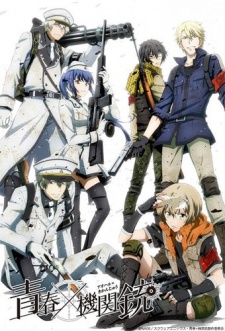
At the outset of Aoharu X Machinegun, we get a setting rife with possible developments. The tomboyish Tachibana is mistaken for a guy by Matsuoka, a playboy host who wants to make his airsoft team the best in Japan. It so happens that the team has a vacancy, and while he doesn’t let girls on his team, a faceoff with Tachibana and the misunderstanding of her gender lead him to pressure Tachibana into joining the team, leveraging against him the massive debt incurred during their battle as her indiscriminate firing broke a number of expensive items in the host club (think Ouran High School Host Club with airsoft). Tachibana’s strong sense of justice forces her to go along with this unreasonable demand, and after breaking through their third teammate’s shell with her honest naivety, she grows to love airsoft and fighting alongside her teammates. Now let’s break this down and see where the developments lead.
Does Tachibana ever reveal her gender to her teammates, who she calls precious friends and trusts more than anything? No, when she finds out why they don’t allow girls on their team, she gets cold feet and avoids revealing her lie, afraid of hurting them further. Except that the reason for their rule begins as chauvinistic, slowly turns annoyingly chivalrous, and is eventually revealed to be virtually baseless. It is an excuse to squeeze drama out of the comical setting with which the show began, with the not-so-vague insinuation that girls should be naturally inclined to avoid it as a sport. If Matsuoka and the other characters treat Tachibana as a guy, then the camera doubles down by giving her special treatment, carefully avoiding any fan service shots the sparse other female get. The Ouran parallels end here; Haruhi is a girl that paints women in a gender neutral light, whereas Tachibana is a girl that simply steps from one side of the gender divide to the other.
The team they all form together is at the center of their survival game world, and indeed they use it interchangeably with their friendship. Of course the one opening holds a dark secret, connected with the third teammate’s introversion and their strict rules against women, related to a sadistic enemy and the exclusive national tournament to decide the best in Japan. But the team becomes fixated not on improving themselves, not on becoming the best in Japan, and to a certain extent not even about enjoying airsoft together, although some incredibly canned dialogue scattered throughout the show gives us the occasional illusion that everything is for the sake of happiness and not a revenge plot. They eventually begin talking about the team so much, it becomes unclear whether they are a team because of their friendship, or if their friendship only exists for the sake of the team.
Their enemy is obvious from the first moment he shows up, even though the show tries to play it cleverly by having him appear kind and normal. He turns out to be evil in a pretty non-descript and unexplained way, ultimately chalked up to a twisted personality and the ability to exploit the rules of airsoft—rules that do not actually exist in the real world—to be an absolute psychopath. And then he becomes nice again and helps Tachibana through her deep emotional slump, which was incidentally brought about by him in a not-so-roundabout way. I’m not convinced the show knew exactly who he was supposed to be.
The debt plotline is dealt with in less than three episodes, and the emotional trauma that seems to dominate the mood near the middle of the show is tossed aside in favor of platitudes and vaguely motivated assertions of keeping people from getting hurt and never giving up. The plots that dominate—from the team to defeating their true enemy to coming clean about Tachibana’s gender—all come in and out as they please, and the ultimate result is a mess of unresolved plot points we are given almost no reason to care about. It was good of the writers to keep airsoft relevant, with issues of coordinated team tactics, different roles, and cheating by not admitting to getting hit all taking their turns. It is never an insult to say that a sports show is less about the sport than the players, but it is certainly a plus for the sport to be well-represented and interesting in its own right. It does happen to be an insult for the characters to not work in the slightest, and while there were times I could see these three working well in some setting and plot, this wasn’t it.